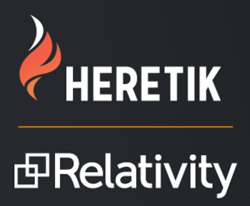 In the before times, I used to travel to events with quantities of video equipment and at least one son to help me, in order to interview people involved in eDiscovery and its related disciplines. It was hard work, but it was worth doing to hear directly from people involved in the industry. Press releases, however good, are constrained by all kinds of factors, and talking to people can uncover more varied ways of describing things.
In the before times, I used to travel to events with quantities of video equipment and at least one son to help me, in order to interview people involved in eDiscovery and its related disciplines. It was hard work, but it was worth doing to hear directly from people involved in the industry. Press releases, however good, are constrained by all kinds of factors, and talking to people can uncover more varied ways of describing things.
I did a lot of these interviews at successive Relativity Fests in Chicago. Relativity would give me a list of people to interview and we would bat through them one after the other with a little time for research or preparation, relying on the certainty that Relativity would send us only people with something interesting to say.
One of those I interviewed in 2018 was Charlie Connor, CEO and co-founder of Heretik, a company of which I knew nothing, specialising in an area which was new to me. Heretik had developed a contract review application in Relativity only three years earlier, in 2015, and was keen to talk about it.
The interview (you can find it here) stood out in my memory for reasons beyond the eloquence and enthusiasm of the interviewee. Contract review was the first distinct function I had come across which took eDiscovery skills and tools and applied them to something analogous but different. This went beyond taking clients from rivals, and beyond things which paralleled litigation (such as regulatory intervention), and into a whole new function. Contracts, of course, feature in litigation discovery, but what Charlie Connor described was a free-standing purpose for text analysis and related workflows serving a broader information governance purpose than merely fighting other companies in litigation or dealing with regulators.
As well as the clients, this offered new opportunities to Relativity solution providers. As I said in my 2018 article:
They hold large volumes of data for clients and want to be able to do more with it than merely perform eDiscovery functions – they can, for example, go to the client and show that they can derive useful information from the data. We are therefore moving from mere identification of risk and burden and into proactive identification of useful material which can form the basis for business decisions.
Possible non-litigation purposes might, I suggested, include post-merger analysis of the data pulled from up from both businesses to find overlaps and to identify areas in which one business had performed more efficiently than the other.
I came away from that interview with two related thoughts – that contract analysis software had an enormous, and still largely untapped, potential, and that Charlie Connor and Heretik would make a success of it.
And here we are, four years later, with Relativity acquiring Heretik in order, as it puts it in the press release, to enable users “to rapidly transform existing agreements into structured, actionable data”. Relativity intends to rename the solution Relativity Contracts, and to integrate it into RelativityOne as an add-on from mid-2023.
You can read the details in the press release and in a blog post here which describes some of the features and benefits, and mentions some of Relativity’s other acquisitions on their road to making RelativityOne a fully integrated solution. I don’t interview everyone who features in my articles, but I thought it would be good to catch up with Charlie Connor, not least because I had enjoyed talking with him in 2018.
What, I asked him, was the biggest single benefit for clients of the soon-to-be-named Relativity Contracts? Speed to review, Charlie Connor said – the ability quickly to identify contracts in a large data set and batch them out to experts in that type of contract. This is a basic discovery process, but you do not need a dispute or a regulator’s inquiry to want the fastest route to examining contracts – or, indeed, any text-based documents which must be compared or analysed.
Charlie Connor said that he had always been interested in finding use cases beyond discovery and into other businesses. In an interesting phrase, he said “We have been spoilt in eDiscovery”, meaning that the technology, skills, and people available for the management and analysis of data in disputes deserved to find application elsewhere. This gives opportunities to firms, businesses and individuals looking for new activities to excel in. They may offer new functions to clients who already know them for eDiscovery, or for developing original functions for the technology. “It surprises me where they take some of this stuff” he said, in a phrase which brings with it the implication that clients have the incentive and opportunity to think of purposes which the developers and the marketing departments wouldn’t necessarily dream of.
Mike Gamson, CEO of Relativity, put it this way: tools like Heretik worked for clients by “helping them expand the problems they’re able to solve”.
Heretik’s own course, in Charlie Connor’s words, has gone from “solving personal frustrations experienced during a diligence review, to analyzing and reviewing millions of documents.”
There is a pleasing circle in the fact that some of those who founded Heretik, including Charlie Connor, had previously worked at Relativity and now, having developed an application which integrates with Relativity, are back under its wide umbrella. That, Charlie Connor said, “will provide the resources and support to help Heretik reach its full potential”.
Perhaps I should interview him again four years from now and find out how the story developed from here.

